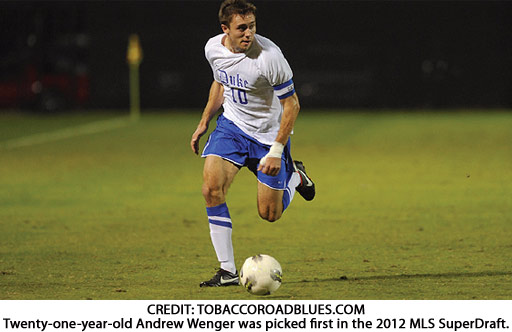Fanshawe FC: Justifying the MLS draft

Last week, Major League Soccer held their annual SuperDraft to choose the best college players to play in their league. The Montreal Impact's first pick was a young defender/striker named Andrew Wenger, a player who has won both Best Defender and Best Offensive player in his conference. Wenger went to Duke, and will stay there until the summer to finish his studies in history. Critics are upset about the fact he wants to finish his education before joining the team. In the end, the draft system is a great tool that the MLS uses to get highly developed players.
People who are against the draft in the MLS argue that the time that could have been spent at a club, being properly scouted and understood in their abilities, they are instead playing in some far-away place at a college. However, all of these schools should be on a team's radar through proper scouting systems. And when the combine comes around, the best players are selected to play a few games in Florida to showcase their skills in one place for all to see. Andrew Wenger is 21 years old coming into his pro career; his skills are more developed, to the point that scouts and coaches alike will have a good understanding of the player he will be in a year, or in 10 years.
The alternative to a draft system would be what the rest of football does in the academy system. Teams will essentially sign players at very young ages and bring them up along with the hopes that they will play for the big team. First of all, the process of providing training and coaches to these younger age groups can be expensive, especially if many of the players turn out to be duds. Second of all, most of them do become duds. The college draft system allows the players who looked promising at 14 not to make it to the big show.
That being said, the talent should not be streamlined to one direction. The SuperDraft has been diminished to only two rounds as most MLS teams currently have active academies. Players should be able to choose their way of progressing as a footballer and as a person. The ability to get a degree before beginning their professional soccer career is important to these footballers as people, and they still need to be treated as such. Critics are calling for the SuperDraft to die, as it's an example of North American sport influence on the league. But providing an education and the experience of post-secondary education would only help produce good footballers in a region where developing talent is a hot button issue.
The draft has produced some of the best players from the continent, like Clint Dempsey, Maurice Edu, Carlos Bocanegra and Brek Shea. This is probably the best system of player development, considering the size of the country and how players who are serious about developing their skills (and those who have skill) and becoming footballers will go to college, and will become visible. All in all, the SuperDraft is an effective way to develop players in North America, and shouldn't be stopped anytime soon.













